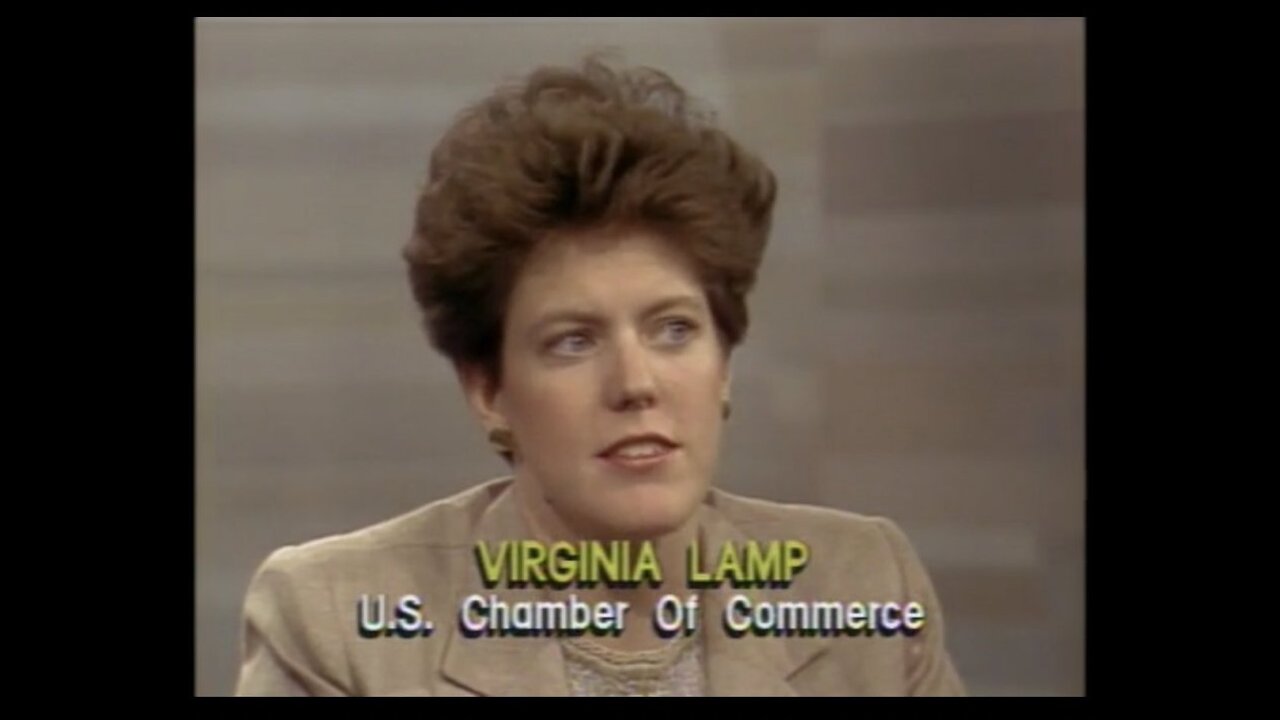Premium Only Content

Virginia "Ginni" Thomas "Lamp" fought "against" Maternity leave for families
Original OS : https://americanarchive.org/catalog/cpb-aacip_507-6t0gt5g183
"Virginia Lamp, a labor attorney for the U. S. Chamber of Commerce, which filed a friend of the court brief opposing the California pregnancy law; and Democratic Congresswoman Pat Schroeder of Colorado, an ardent supporter of pregnancy leave who has introduced legislation that would require it nationally. Congresswoman, what do you make of today's decision? What do you think of it? Rep. PATRICIA SCHROEDER (D) Colorado: I'm delighted. It says the Reagan Supreme Court has understood what a tremendous change there has been in the world, especially in the United States, in the work force. And I thought Justice Marshall kind of summed it all up. They're trying to find a way that women can work and have families and not be discriminated against. And this is a key way. They're saying that equality doesn't necessarily mean the same, because we know that men and women are not the same. And trying to figure out how you deal with equality, with the real world, with all of that -- I thought it was a sophisticated analysis, and I hope that my colleagues in the Congress are as aware of how things have changed as the Supreme Court appears to be today. LEHRER: Ms. Lamp, what do you think of this decision? VIRGINIA LAMP, U. S. Chamber of Commerce: Well, I guess we're going to have to disagree on this one. The business community, I think it's fair to say, was shocked and disappointed by the decision. It was a victory today for those who are proponents of special treatment for women in our laws. And that cuts at a very fundamental principle in our laws. And for those who are proponents in the women's movement, because a lot of the women's groups are proponents of fair treatment, equal treatment, not special treatment such as the days when we had protective legislation. Interestingly enough, as you mentioned, the Chamber -- LEHRER: But you mean in the past when there was protective legislation for others, you mean. Ms. LAMP: For other women. LEHRER: For other women. Okay. Ms. LAMP: Right. Interestingly enough, as you mentioned, the Chamber of Commerce joined with some women's groups who saw this special law benefiting women workers or pregnant workers as contrary to those federal laws that require equal treatment. LEHRER: What do you think the impact of this is going to be, though, around in business or in any way you want to interpret it? You say it's bad, it's a disappointment, and it's a shock. What -- what are the implications? Ms. LAMP: Well, I think there's two dangerous implications for the employers. One of them, as was mentioned, is that I think we're going to see a lot more legislative activity, political activity, on this, trying to get legislative bodies like state legislatures or Congress into deciding what the benefit packages of employers should be. And on another point of view, you're going to see a lot of pressure, say in the state of California, for new benefits -- disability benefits given to men in the states where you don't have mandated benefits for disability to try to bring benefits up to the level -- LEHRER: What women have. Ms. LAMP: Right. LEHRER: I see. Congresswoman, youagree with that? How would you see the implications? Rep. SCHROEDER: Well, I'm more positive. And I would hope that the chamber would join the Reagan Supreme Court and deal with the real world. I think what's going to happen, I hope, is that Congressman Clay's bill and my bill that we've introduced before then passes. Because realistically -- LEHRER: Tell me again about your bill. Rep. SCHROEDER: Well, sure. Realistically, what this decision does is, it extends these benefits to women in California, period. And what we're trying to do is say -- LEHRER: Though there are eight -- Lyle said five, but our count, Lyle, was that there were eight other states that had similar laws to California's. Did anybody -- do you agree with that, or was that -- Mr. DENNISTON: Well, there's some varying interpretations as to what's in the laws and which are like California's. Rep. SCHROEDER: And which is similar and which isn't. LEHRER: What is your count? Rep. SCHROEDER: Well, what I'm trying to say is, I think I've got something I can even get Virginia and the chamber on. If she's worried about inequality, what we are trying to do is say at the federal level there should be a parental leave policy. And that is that either a male or a female could have four months off of leave without pay at the birth or adoption of a child. LEHRER: Required by federal law? Rep. SCHROEDER: Absolutely. And we look at that as a minimum labor standard. You put that down. Employers can build on it if they want to. But that's the bottom line. And so mothers and fathers are treated the same anywhere they live in America, not just in the few states that have moved forward. LEHRER: Is it your feeling that if this were to be enacted into law that this Supreme Court, based on this decision today, would approve it -- say it was constitutional? Rep. SCHROEDER: Yes, I think they would. And I think they'd applaud it. Because the real problem that you have here is we all know that the child and the parent need a period of time to bond -- that it doesn't happen in the delivery room. So just the physical health of the mother is not relevant. And we know that that bonding is very, very, very important. We've done the research, and our country's showing that. Every other country in the world, except five, has passed legislation dealing with this. And it seems to me we need to. LEHRER: Congresswoman Schroeder says that you'll agree with her on this, or she's looking for you to agree with her. Will you? Ms. LAMP: I doubt it. The answer to some of the points she's raised, there are a lot of countries who offer generous maternity leave policies. It just so happens that our country has, perhaps, the highest wage levels in the whole world, as far as the wages we give to our workers. It just so happens that we have some of the most freedoms -- some of the basic fundamental freedoms, economic and political, than a lot of those countries. I would hate to give up either of those things for new federal standards that tend to reduce entrepreneurial activity, reduce job creation which -- jobs are probably the fundamental job family -- pro family stance. And a healthy economy is the best thing for a family; not a rigid, inflexible, costly federal standard. We just don't need to turn in that direction. Rep. SCHROEDER: Well, the reason I'm laughing is, first of all, you said you were concerned because it wasn't extended to men. So I'm saying here we are, let's extend it to men. That makes sense to me. Secondly, the cost of ours is shameful, compared with everywhere else. We are talking about leave without pay. And we're talking about a world where that freedom that you're talking about, Virginia, isn't extended to the average American family. I mean, when I came out of law school, yes. But today, an automobile costs what a house cost when I came out of law school, and salaries haven't stayed up there. So people are having to choose between having a child and having a job. And I think this has permeated the skulls of the Supreme Court. Hooray. I applaud it. I think that's wonderful. And I hope it permeates the skulls of the Congress and also the chamber. But we're talking about every major industrialized country that's moved in in this area. I mean, the five that haven't done it are the United States, South Africa, Upper Volta, the Sudan and Ghana. Now, everyone else is out there competing with us, knocking our socks off, and has gone way beyond this. They've given up to a year, they give pay, they give everything. We're saying as a federal policy, four months leave without pay. LEHRER: What would be the harm of that, Ms. Lamp -- of a four year federal -- I mean, a four month federally mandated maternity leave without pay for everybody? Ms. LAMP: Well, the problem with this kind of debate is that you try to impose one rigid federal standard on a variety of industries, a variety of sizes of governments. Small business can't afford generous leave policies. Maybe they can do some other things to accommodate -- LEHRER: Give me some examples there of how it affects small business or would adversely affect a small business. Ms. LAMP: Say a construction site, where you have specifically, specially trained workers who know their job, know how to do it. Say you have a pregnant person on that work site or a parent -- a father who wants to take four months off to spend with their child to bond. You have a problem. The job might be over by the time they come back. What are they to do? Are they to be employed at a different work site? What if that's in Texas and this one was in California? You have all sorts of practical problems from that perspective. Dry cleaners -- perhaps they don't have enough people to replace trained workers. LEHRER: Do you buy the congresswoman's argument that it takes four months to bond, to bind? Ms. LAMP: Well, I'm not a sociologist. And I'm a little bit fearful that there aren't many in Congress who are qualified for that kind of decision making. I think you have a lot of employers who are recognizing that family people who are working for them need some flexibility to meet their responsibilities and are accommodating them in different ways, not perennially -- LEHRER: Let me ask Lyle a question. Lyle, do you read the Supreme Court decision today at least that the majority feels that four months is a -- because that was in the California law -- has now the Supreme Court made that a standard of some kind? Mr. DENNISTON: No, that's what lawyers would call a policy question, and the Supreme Court doesn't make policy questions. Congress having said that ''We're going to prevent discrimination based on pregnancy,'' and California having said, ''We want to go a step further and grant four months,'' the only question before the court today is, had Congress allowed California to make that policy judgement. LEHRER: Did California have the right to make the decision. Not that the decision was necessarily right. Mr. DENNISTON: California had the legal right to make that decision, the authority to make that decision. By the way, you asked, Jim, a moment ago whether or not, if Congresswoman Schroeder's bill was passed, whether the Supreme Court would uphold it. That, I think, is almost an open and shut question. The Congress has such incredible authority when it passes laws to deal with the regulation of commerce -- that is, business. That's a constitutional question. Today was simply an interpretation of what Congress meant in passing a law. LEHRER: So Ms. Lamp, do you feel that -- you're position has been dealt a very serious blow today by this court ruling, correct? Ms. LAMP: Well, from the lobbying point of view, we were more involved with whether parental leave as a national mandate would be a wise decision for society to make; not whether, as he mentioned, whether Congress has the power or whether the states have the power to impose such a policy. That was relevant, and we got involved in that issue, but the broader, more important question is whether it's good for society and good for business and good for women and all sorts of other issues. LEHRER: Are you going strong now on this to try and get your law enacted? Rep. SCHROEDER: Absolutely. In fact -- LEHRER: It has never gone anywhere in the past. Rep. SCHROEDER: Well, now, that's not right. LEHRER: Well, never been enacted. All right. Rep. SCHROEDER: We introduced it a year ago, and it moved at light speed through the House, because we got it through all the committees, through the Rules Committee, and it was ready to go to the floor. The only reason it wasn't brought up in the final days was it hadn't had a hearing, even, in the Senate. And the Senate was where it was absolutely in the quagmire. But this time, we have a new Senate. And Congressman Clay and I will be reintroducing it at the end of this month. Senator Dodd's already introduced it in the Senate. Hearings are scheduled. LEHRER: He has a similar bill to yours in the Senate. Rep. SCHROEDER: Absolutely. And we've already -- the hearings have already been set in early February. Let me tell you, for the Congress, that's an incredible, neck break speed. LEHRER: Ms. Lamp, is this a big deal to the Chamber of Commerce? Are you going to go to the mat with Congresswoman Schroeder, etc. , or is this just something that you're mildly interested in defeating? Ms. LAMP: It's a priority issue. And it's a priority not because the chamber says it's a priority; it's because our members tell us it's a priority issue to them. LEHRER: Costs a lot of money -- you mean in money terms? Ms. LAMP: They want flexibility. They want to decide what their employee benefits should look like and what leaves they should give to which employees, good ones versus bad ones. They want flexibility, and we want to try to preserve that for as long as we can. Rep. SCHROEDER: And we say that it's very important for America, if we're going to have families, to deal with the fact that families are going to have to be in the workplace. And you know, we're going to pay one time or another. We either pay now or we pay later. And we know the cost of not getting children off to a good start. LEHRER: Okay. Congresswoman Schroeder, Ms. Lamp, Lyle Denniston, thank you all three very much. No Job, No Future? HUNTER-GAULT: What should the federal government do for hundreds of thousands of workers who lose their jobs each year through no fault of their own? Labor Secretary William Brock provided some answers on Capitol Hill today, where he outlined the administration's $1 billion proposal to retrain such displaced workers. Secretary Brock's comments came a day after he received a major report from a Presidential task force calling for massive federal assistance to help displaced workers. We'll debate the merits of the task force and Secretary Brock's recommendations in a moment. But first, some background on the problem."
-
 1:03:14
1:03:14
F12osint #OSINT
2 years agoSept 2022 screen shot OS Joseph Flynn Twitter - OS (oct 3 2022 snap shot of OS)
144 -
 18:54
18:54
The Rubin Report
13 hours agoHow One Woman Outsmarted Pornhub & Exposed Its Dark Secrets | Laila Mickelwait
154K122 -
 LIVE
LIVE
Major League Fishing
5 days agoLIVE! - Bass Pro Tour: Stage 3 - Day 4
864 watching -
 1:05:28
1:05:28
Sports Wars
16 hours agoLebron GOES OFF Over Bronny Hate, Pereira LOSES Belt To Ankalaev At UFC 313, Xavier Worthy Arrested
105K19 -
 10:27
10:27
Tactical Advisor
1 day agoDMR or SPR for Civilian Use?
102K6 -
 8:21
8:21
DEADBUGsays
1 day agoThe Crossbow Killer
96.8K22 -
 8:40
8:40
Tundra Tactical
1 day ago $13.35 earnedThe Executive Order Wishlist.
101K7 -
 7:22:52
7:22:52
SpartakusLIVE
1 day agoSaturday SPARTOON Solos to Start || Duos w/ StevieT Later
185K4 -
 28:40
28:40
SLS - Street League Skateboarding
9 days agoTOP MOMENTS IN WOMEN’S SLS HISTORY! ALL THE 9’s - Rayssa Leal, Leticia Bufoni, Chloe Covell & more…
129K11 -
 2:03:03
2:03:03
The Connect: With Johnny Mitchell
1 day ago $13.57 earnedHow Mexican & Chinese Cartels Control Illegal Marijuana Cultivation In America Using SLAVE Labor
90.9K27